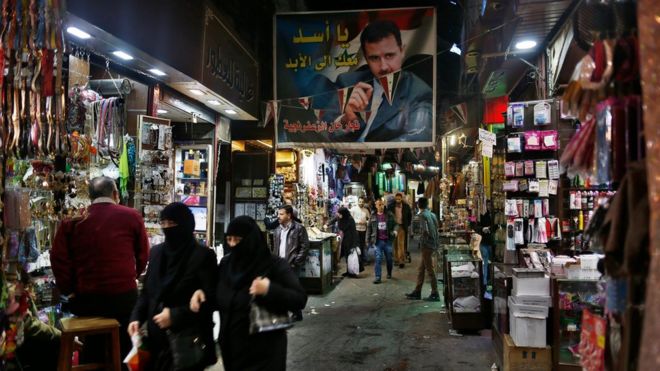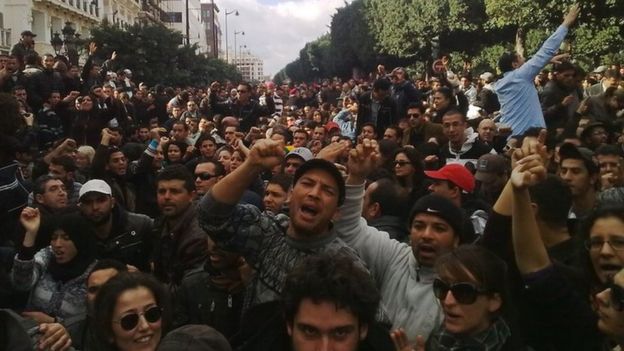
It is five years since peaceful protests against Syria's President Bashar al-Assad started in Damascus.
The uprising quickly escalated into a civil war between the Syrian government and various rebel factions, killing at least 250,000 and displacing many more.
Similar movements in the region, later called the Arab Spring, led to the ousting of Hosni Mubarak in Egypt, Muammar Gaddafi in Libya and Zine al-Abidine Ben Ali in Tunisia.
Five years on, people across the region have told the BBC how the uprising and the political divisions and economic turmoil that followed have affected their lives.
Syria's civil war
"I had to leave my pregnant wife behind. It was too dangerous for me to stay," says Majdy Al-Kassem, who fled Syria in early 2015 and now lives in the UK.
Majdy studied English literature in his hometown Idlib in north-western Syria when peaceful anti-government protests erupted in 2011. He and fellow students joined the demonstrations.
"In the first six months protesters were not armed, but the security forces started to shoot at people and come to their houses to arrest them," he says.
Some of the protests turned into armed insurgency and following violent clashes a brutal and complex civil war broke out across most of the country.
"One of my teachers was killed by a sniper and in the following years a lot of my friends died in prison. I was afraid that somebody who saw me at the demonstration would frame me," he says.
A month after Majdy fled, a coalition of Islamist rebel forces, supported by Turkey and Saudi Arabia, seized Idlib from the Syrian government.
"It's a little bit safer now because there is no fighting in the city itself, but your house can always be hit by Russian or Syrian government air strikes. Many houses in our neighbourhood were destroyed.
"My family is in a very bad situation now. They often don't have the most basic things like water, electricity and petrol."
The rise of the so-called Islamic State and the increasing involvement of foreign powers have further complicated the conflict.
Like many others, Majdy made the dangerous journey across the Aegean Sea from Turkey to Greece in a rubber dinghy. Walking northwards on the so-called Balkan route, he was imprisoned in Croatia for three months, but eventually made it to the UK last summer.
The authorities in the UK are now processing Majdy's asylum application and he says: "I hope they let me stay and bring my family."
Tunisia: Poster child of the Arab Spring?

Hisham Ben Khamsa was among thousands who protested against Tunisia's former president in Tunis in January 2011
The first protests of the Arab Spring started in Tunisia after Mohamed Bouazizi, a street vendor, set himself on fire in the city of Sidi Bouzid in December 2010.
Weeks of demonstrations followed before Tunisia's long-time president Zine al-Abidine Ben Ali fled into exile on 14 January 2011.
"When we went to demonstrate in front of the Ministry of the Interior in Tunis on 14 January, we didn't realise that Ben Ali would be running away by the end of the day," says Hisham Ben Khamsa.
"Ben Ali had relied on stifling any kind of expression and dissent. The regime was out of sync with the population. Corruption and unemployment pushed people overboard."
Tunisia has been called the Arab Spring's "success story" by some after a largely peaceful transition to democracy.
In recent years, the country has been hit by a wave of attacks on tourists sites and renewed protests over youth unemployment.
"Economically and in terms of instability, it has been five years of a rollercoaster. But in this chaos and mayhem, there is some stability building up," Hisham told the BBC.
Ines Ghaieb, a preparatory school teacher in Tunis, says her life changed for the better after the uprising.
"I lost my job at the school during Ben Ali's time and couldn't do anything about it. Now I have a permanent contract."
She says that Tunisians can now express their opinions in public and in the media.
"Tunisia was an exception from the beginning. Even if there are problems, I would say the revolution was successful."
Pictures of tens of thousands of protesters on Cairo's central Tahrir Square went around the world in January and February 2011.
"I'll never experience the same again, the spirit of the people was unbelievable, and we were all on the same page," says Mohammed Safi, an Egyptian radio DJ.
"We succeeded in bringing the government down after 18 days, but the biggest mistake was to leave the square because we thought we had won.
Mohamed Morsi, a leading member of the Muslim brotherhood, was elected as president in June 2012, but following mass protests his government was overthrown by the army a year later.
"I think almost the entire nation is suffering from post-traumatic stress," Mohammed says.
"I moved out of Cairo three years ago to protect my sanity. The vibe there has become unbearable.
"Five years down the line, many people are extremely sceptictal and frustrated. Almost everybody is suffering economically and the currency has lost a lot of value."
Human rights activists have reported a rise in the number of people going missing at the hand of the security services.
"The security apparatus is more intense than under Mubarak, but the message to future generations is that you can challenge authority," says Mohammed.
"In the early months of 2011, not a lot of Libyans thought the protests would spread from Tunisia to Libya because the former regime of Muammar Gaddafi had a tight grip on society," says Muhanned Kalash, an up-and-coming Libyan actor.
"When the protests started in Benghazi, we couldn't do much in Tripoli, but of course we followed the events very closely."
Fierce fighting broke out between rebels in the east of the country and government forces. In August 2011, rebel militia toppled Gaddafi and took over Tripoli, helped by international airstrikes.
Muhanned says that five years on, none of the revolution's goals have been achieved.
"It's close to impossible for me to save money, to marry, to travel to different cities or even to go out at night because there is a risk we might get carjacked."
Libya has had two rival governments since 2014.
The political and security vacuum in the country has helped the so-called Islamic State group to establish a foothold.
Muhanned says security is his biggest concern at the moment: "With Daesh [IS], it's like we see a storm approaching, but we're pretending we are not scared.
"It's shocking to see how OK Libyans have become with death."



No comments:
Post a Comment